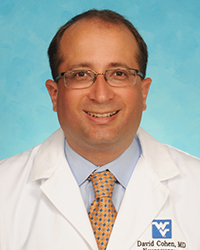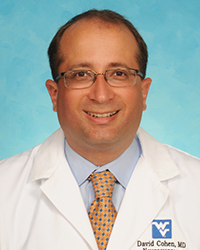Life-Saving Care, Close to Home: Wheeling Hospital’s Neurosurgery Team Makes the Difference


The distance between Wheeling and Morgantown or Pittsburgh is only 60 to 80 miles, but when you’re experiencing a neurological emergency, it could be the difference between life and death.
Dr. David Cohen, Chief of Neurosurgery at WVU Medicine Wheeling Hospital recently had a patient with this experience.
A patient came to the emergency room complaining of a headache and feeling off.
“In the ER he underwent a head CT scan which showed a large acute subdural hematoma (bleeding on the surface of his brain) which was causing a lot of pressure in his head,” says Dr. Cohen.
“If neurosurgery was not available in Wheeling and he had to be transferred to Morgantown, he may have ended up in much worse condition by the time he got there, or perhaps not survived.”
Instead, Dr. Cohen was able to take him emergently to the OR in Wheeling for a craniotomy to evacuate the hemorrhage. He has made a great recovery so far.
Wheeling Hospital officially joined WVU Medicine in 2021, but many of the neurosurgeons like Dr. Cohen have been with Wheeling Hospital for decades, working in the community and caring for patients at Ruby Memorial as well as Wheeling Hospital.
“I like to think that we helped ‘lead the way’ to see what the benefits of care collaboration/coordination could be since all of us also have appointments at Ruby. Having the other local hospitals (Reynolds, Wetzel, Barnesville, Harrison, Weirton) in the system with us also helps us provide care to more patients in the region while allowing them to remain local,” he says.
Having access to a world-class neurological department close to home is a huge asset to the local community, who would otherwise have to travel to Morgantown or Pittsburgh for care. In emergency cases, this means getting life-saving treatment much more quickly.
“In more routine situations, such as elective spinal surgery, taking care of patients in Wheeling is much more convenient for them and probably increases the likelihood that they will pursue treatment for their condition,” says Dr. Cohen.
There are more practical benefits to being able to receive care locally, making it easier for patients’ families to visit and provide support during treatment. Patients who are treated locally are also more easily able to maintain contact with their regular medical team instead of being sent to an unfamiliar place with new doctors who are not acquainted with them.
Wheeling Hospital’s neurosurgery department is equipped to expertly handle at least 90% of cases. The most common types of neurological problems that they treat include degenerative spinal conditions like herniated disks, spinal stenosis, spinal instability, spinal traumas, and spinal tumors. They also treat head injuries, vascular problems like hemorrhages and subdural hematomas, hydrocephalus, and brain tumors.
“There are some types of cases that we do not perform at Wheeling, such as surgical or endovascular treatment of aneurysms, or surgery for more complex brain tumors, for example,” says Dr. Cohen.
“In those cases, we are able to fairly seamlessly coordinate with our colleagues in Morgantown who specialize in these procedures to help obtain optimal care for these patients.”
The team at Wheeling offers a wide variety of the most common and cutting-edge procedures, like lumbar laminectomy and microdisectomy, fusions, kyphoplasty, craniotomy procedures, and spinal cord stimulation for chronic pain.
Wheeling Hospital recently obtained a Medtronic StealthStation navigation, along with an O-arm surgical imaging system.
“These pieces of equipment have been truly groundbreaking for Wheeling Hospital. In spine surgery, this equipment allows us to see the patient’s anatomy on a screen in real-time as we are performing surgery, almost like playing a video game,” says Dr. Cohen.
He explains that the imaging and navigational equipment allow for better precision when placing surgical hardware. It also reduces the need for intraoperative x-rays, reducing radiation exposure for patients and staff. The imaging technology allows the surgeon to verify that all hardware was properly placed after surgery while the patient is still asleep, avoiding the need of a corrective surgery.
This equipment also helps facilitate more minimally invasive procedures. By placing hardware through a few small incisions, instead of a traditional large incision, patients’ postop pain may be reduced and their recovery quickened.
“For cranial surgery, like brain tumor resection, this technology likewise allows us to ‘see’ exactly where the tumor is in the patient’s head as we are approaching it. This helps ensure that we are taking the whole tumor out, and keep the incision as small as possible,” says Dr. Cohen.
The department hopes to expand their offering of surgical procedures in the future, including minimally invasive and robotic procedures.
Dr. Cohen is proud of the team of neurosurgeons who have been in the Ohio Valley for years, many of them with university faculty appointments. They have provided neurosurgical care in the Ohio Valley for over 20 years at Wheeling Hospital and facilitate patient care when they need the expertise available in Morgantown.
“There are no other neurosurgeons in the Upper Ohio Valley who can make this claim. We are proud to be able to take care of patients here close to home,” says Dr. Cohen.
Sponsored content brought to you by WVU Medicine.
